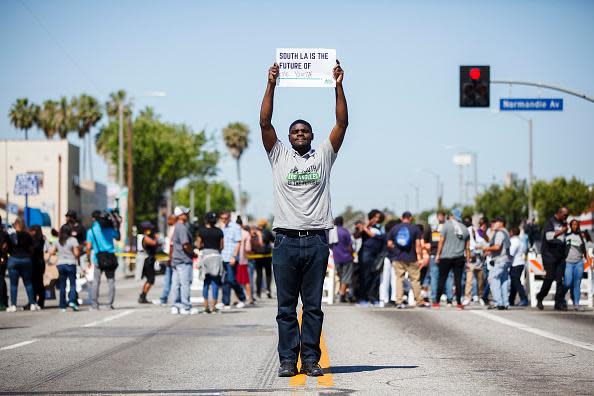LA riots 1992: How the Rodney King verdict sparked violence and civil unrest in Los Angeles

Twenty-eight years ago, the iconic city of Los Angeles fell into a state of historic unrest after four police officers were acquitted in the savage beating of an African-American man named Rodney King.
King suffered skull fractures, permanent brain damage and broken bones during the vicious attack, which was captured on video and sparked a national conversation about police brutality and racial inequality that continues to this day.
The trial drew worldwide media attention after a man named George Holliday filmed the beating from the balcony of his apartment and sent the recording to KTLA, a local news station, in 1991. King, who was on parole for robbery at the time, led police on a high-speed chase before the incident occurred. He was later released without charge.
Four white LAPD officers, including one sergeant, were subsequently charged with assault and use of excessive force. The seventeen officers who were reported to have stood by and watched were never indicted.
But almost a year later, on 29 April 1992, the police officers were acquitted, sparking the worst race riots in US history.
The verdict led to five days of violent protests in which 50 people died and over 2,000 were injured. Nearly 1,000 buildings throughout the city that were damaged or totally destroyed, causing more than $1bn in damages. Almost 12,000 people were arrested.
Demonstrators were enraged over the trial, which featured nine white jurors and just three people of colour, arguing that it evidenced the systemic racism within the criminal justice system.
It also followed the recent killing of Latasha Harlins, who was fatally shot in southern Los Angeles in 1991 while going to the grocery store to buy orange juice. Harlins was just 15-years-old.
The riots were also the culmination of decades of anger surrounding racial and economic inequalities in southern California and throughout the US.
As people took to the streets, King called for calm in an emotional plea.
“People, I just want to say, can we all get along? Can we get along?” he asked. “Can we stop making it horrible for the older people and the kids?"
King’s beating was one of the first instances of police brutality against an unarmed black man in the US to have been recorded and seen all over the world. Twenty-eight years on, similar disturbing videos of police brutality against unarmed black men continue to garner widespread media attention as people continue to demand criminal justice reform.

